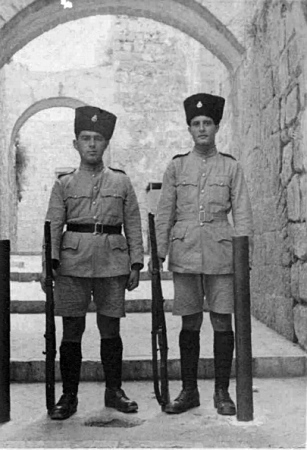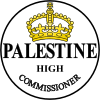
The Irgun was a Zionist paramilitary organization that operated in Mandate Palestine between 1931 and 1948. The organization is also referred to as Etzel, an acronym of the Hebrew initials, or by the abbreviation IZL. It was an offshoot of the older and larger Jewish paramilitary organization Haganah. When the group broke from the Haganah it became known as the Haganah Bet, or alternatively as haHaganah haLeumit or Hama'amad. Irgun members were absorbed into the Israel Defense Forces at the start of the 1948 Arab–Israeli war.

Zionist political violence refers to acts of violence or terror committed by Zionists. The period of Zionist political violence started on June 30, 1924, and continued on a sporadic basis.
Haganah was the main paramilitary organization of the Jewish population ("Yishuv") in Mandatory Palestine between 1920 and 1948, when it became the core of the Israel Defense Forces (IDF).

The 1936–1939 Arab revolt in Palestine, later came to be known as The Great Revolt or The Great Palestinian Revolt, was a nationalist uprising by Palestinian Arabs in Mandatory Palestine against the British administration of the Palestine Mandate, demanding Arab independence and the end of the policy of open-ended Jewish immigration and land purchases with the stated goal of establishing a "Jewish National Home". The dissent was directly influenced by the Qassamite rebellion, following the killing of Sheikh Izz ad-Din al-Qassam in 1935, as well as the declaration by Hajj Amin al-Husseini of 16 May 1936 as 'Palestine Day' and calling for a General Strike. The revolt was branded by many in the Jewish Yishuv as "immoral and terroristic", often comparing it to fascism and Nazism. Ben Gurion, however, described Arab causes as fear of growing Jewish economic power, opposition to mass Jewish immigration and fear of the English identification with Zionism.
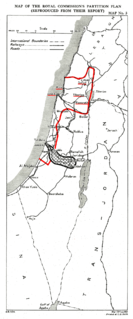
The Peel Commission, formally known as the Palestine Royal Commission, was a British Royal Commission of Inquiry, headed by Lord Peel, appointed in 1936 to investigate the causes of unrest in Mandatory Palestine, which was administered by Britain, following the six-month-long Arab general strike in Mandatory Palestine.

The Notrim were a Jewish Police Force set up by the British in Mandatory Palestine in 1936 to help defend Jewish lives and property during the 1936–39 Arab revolt in Palestine. The force was divided into Supernumerary Police and highly mobile Settlement Police. Members were recruited almost entirely from the Haganah.

The Jewish Settlement Police (JSP) were a division of the Notrim established in Mandatory Palestine in 1936, during the 1936-39 Arab revolt.

The Special Night Squads (SNS) were a joint British-Jewish counter-insurgency unit, established by Captain Orde Wingate in Mandatory Palestine in 1938, during the 1936-1939 Arab revolt. The SNS basically comprised British infantry soldiers, together with some men drawn from the Jewish Supernumerary Police, and total unit strength was 100 by 1938. Wingate selected his men personally, among them Yigal Allon and Moshe Dayan, and trained them to form small mobile striking units. Wingate also collaborated with the Jewish paramilitary formation, the Haganah, reinforcing his unit with some of Haganah's Fosh commandos. Given British opposition to the formal creation of Jewish military units, it is not clear to what degree the authorities were aware of the exact details of Wingate's operations in this regard.
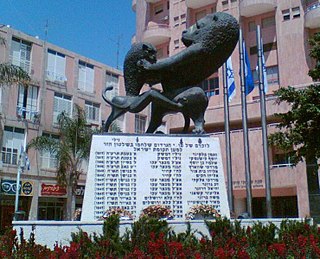
Olei Hagardom refers to members of the two Jewish Revisionist pre-state underground organisations Irgun and Lehi, who were tried in British Mandate courts and sentenced to death by hanging, most of them in Acre prison. There were 12 Olei Hagardom.
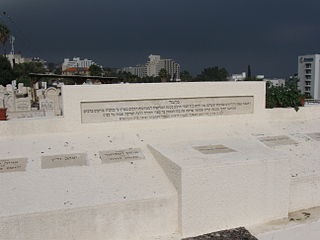
The Tiberias massacre took place on 2 October 1938, during the 1936–39 Arab revolt in Tiberias, then located in the British Mandate of Palestine and today is located in the State of Israel.
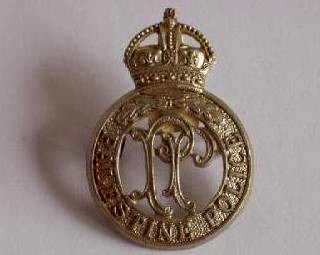
The Palestine Police Force was a British colonial police service established in Mandatory Palestine on 1 July 1920, when High Commissioner Sir Herbert Samuel's civil administration took over responsibility for security from General Allenby's Occupied Enemy Territory Administration (South).

Balad al-Sheikh or Balad ash-Shaykh was a Palestinian Arab village located just north of Mount Carmel, 7 kilometers (4.3 mi) southeast of Haifa. Currently the town's land is located within the jurisdiction of the Israeli city, Nesher.

The intercommunal conflict in Mandatory Palestine was the civil, political and armed struggle between Palestinian Arabs and Jewish Yishuv during the British rule in Mandatory Palestine, beginning from the violent spillover of the Franco-Syrian War in 1920 and until the onset of the 1948 Arab–Israeli War.

Hanita is a kibbutz in northern Israel. Located in the western Galilee approximately 15 kilometres northeast of Nahariya, it falls under the jurisdiction of Mateh Asher Regional Council. In 2019 it had a population of 756.

The Hebron massacre refers to the killing of sixty-seven or sixty-nine Jews on 24 August 1929 in Hebron, then part of Mandatory Palestine, by Arabs incited to violence by rumors that Jews were planning to seize control of the Temple Mount in Jerusalem. The event also left scores seriously wounded or maimed. Jewish homes were pillaged and synagogues were ransacked. Some of the 435 Jews who survived were hidden by local Arab families, although the extent of this phenomenon is debated. Soon after, all Hebron's Jews were evacuated by the British authorities. Many returned in 1931, but almost all were evacuated at the outbreak of the 1936–39 Arab revolt in Palestine. The massacre formed part of the 1929 Palestine riots, in which a total of 133 Jews and 110 Arabs were killed, and brought the centuries-old Jewish presence in Hebron to an end.
The Mobile Guards, also known as the Manim from the initials of the Hebrew words, were a branch of the Notrim in Mandatory Palestine established at the beginning of the 1936–39 Arab revolt in Palestine to ambush Arab terrorists and to protect Jewish settlements and workers in their orchards and fields.

Mandatory Palestine was a geopolitical entity established between 1920 and 1948 in the region of Palestine under the terms of the League of Nations Mandate for Palestine.

Palestinian Fedayeen insurgency refers to the armed cross-border conflict, which peaked between 1949 and 1956, involving Israel and Palestinian militants, mainly based in the Gaza Strip, under the nominal control, of the All-Palestine Protectorate – a Palestinian client-state of Egypt declared in October 1948, which became the focal point of the Palestinian fedayeen activity. The conflict was parallel to the Palestinian infiltration phenomenon. Hundreds were killed on the course of the conflict, which declined after the 1956 Suez War.
The Jaffa riots of April 1936, refers to a spate of violent attacks on Jews that began on 19 April 1936 in Jaffa. A total of 14 Jews and 2 Arabs were killed during the riots.
Black Sunday, 1937 refers to a series of acts undertaken by Jewish militants of the Irgun faction against Arab civilians on 14 November 1937. It was among the first challenges to the Havlagah policy not to retaliate against Arab attacks on Jewish civilians.
